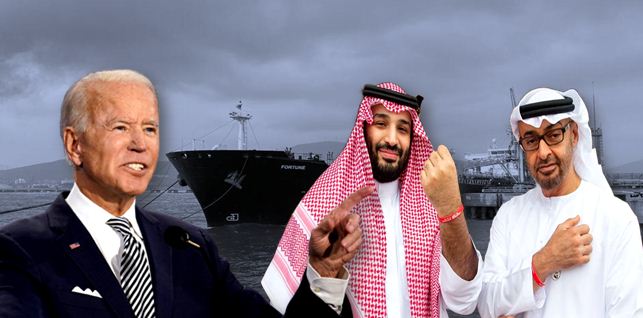There’s no doubt about the fact that Iran is a national security threat for America. The US intelligence committee says Iran remains committed to developing terror networks inside the US.
In January, a State Department report clearly cited a “serious and credible threat” on the lives of former Secretary of State Mike Pompeo and former Trump administration Iran envoy Brian Hook. However, US Secretary of State Antony Blinken would emphasize that such reports should not derail the new nuclear deal.
Biden’s surprising tough stance on Iran
But, the US administration has surprisingly taken a tough stand against Iran over the last 48 hours. Associated Press reported on March 11 that the US has quietly seized the cargo of two tankers suspected of transporting Iranian oil. In 2018, the Donald Trump administration had unilaterally killed the JCPOA deal and imposed sweeping sanctions on Iranian oil.
Due to the American sanctions, Iran is not allowed to sell its oil in the international oil market. But the Biden administration didn’t enforce these sanctions religiously, in order to get Iran back into the new nuclear deal. But the seizure reported on March 11 was a tough signal from the Biden administration that it won’t let Iran get off the hook despite the world’s attention on the Ukraine situation.
As soon as Iran’s oil tanker was seized by the US, the Shi’ite nation responded by saying that it may jeopardize the agreement over the new deal. And then, it was later reported by Bloomberg that the world powers had suspended their efforts to revive the 2015 nuclear accord.
EU officials said that the talks were suspended due to some “external factors.” The suspension of Vienna talks was another signal that the US was not keen on continuing its softened approach on Iran.
What’s behind this sudden behavioural change?
The US knew that antagonizing Iran at this crucial time could very well exacerbate the USA’s energy woes, and Iran held the key to resolving the oil and gas crisis in Europe and the world. But it didn’t hinder Biden from going all but offensive against Iran.
Well, the answer to this question lies not in Washington DC but in Riyadh and Abu Dhabi. The US desperately wants to please Saudi Arabia and the UAE. These are the only OPEC+ powers that still have the spare capacity to pump out more oil and dampen the red-hot inflation in the US energy markets.
Arabs play carrot-and-stick with Biden
The UAE embassy in the US said in a statement this week, “We favour production increases and will be encouraging OPEC to consider higher production levels.” And later on, it was reported on Wednesday that Global oil prices fell by the most in nearly two years. It was a big relief for the US. The US realized Iran can’t help America the way Arabs can.
The Americans fell for this bait. This came hot on the heels of a hard-hitting strike on Biden by Arab leaders. A Wall Street Journal report had revealed on Tuesday that Biden simply got ghosted by Saudi Crown Prince Mohammed bin Salman (MBS) and the crown prince of Abu Dhabi, Mohammed bin Zayed Al Nahyan (MBZ); just because they were more interested in listening to what Putin had for them.
The Arab leaders tactfully made Biden realize two things. First, Biden was simply living at their mercy. Second, they can help the US find its way out of the energy crisis should Iran be shown its place. The roof-breaking inflation in the US and his unfavourable position on the Ukraine crisis was motivating enough for Biden to give up his love for Iran. Now Biden has placed his all bets on Arab leaders, whom he kept despising vehemently through his year-old tenure. Biden’s disastrous foreign policy is finally paying off!
